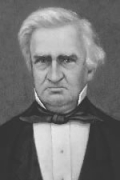Awards
- Honorary Degree - 1849
- LL.D.
- Doctor of Laws
- Bloomington, Indiana
- Presenter: Andrew Wylie

Charles Dewey was born in 1784 in Massachusetts. He graduated from Williams College. In December 1816, he moved to Paoli, in the brand new state of Indiana. He was admitted to the bar in Corydon in 1817. Governor Jennings of Indiana hired him as his own attorney in 1818 in a contest over possession of the governor’s office. Dewey was a visibly strong friend and defender of Indiana Governor Jennings when an attempt was made to censure the governor. From that time forward, he steadily rose as a leader of the state’s lawyers.
In 1820, Dewey was on the first Board of Trustees for Indiana State Seminary (now IU). It was 1825 before the college would actually welcome its first students to a physical campus.
In 1821, Dewey represented Orange County in the state legislature. He served as U.S. District Attorney for the state of Indiana from 1821 to 1829. From 1833 to 1836, he was a prosecuting circuit attorney for the state and was a justice of the Indiana Supreme Court from 1836 to 1847.
In September 1844, IU conferred Dewey with an honorary degree of L. L. D. From 1847 to 1862, he practiced law in Charlestown, Indiana.
In 1849, Dewey was thrown from a buggy, partially crippling him; as a result, he was on crutches for the rest of his life, but he continued to practice law. He died in 1862.
When a contemporary judge took a last look at his corpse, he was quoted as saying, “The equal of Daniel Webster is in that coffin today.”
According to biographer Lewis Baird, “No previous Judge in Indiana had ever attained the celebrity that was given Judge Dewey while on the Supreme bench.” Leander Monks wrote that Dewey was an avid storyteller with the mannerisms of a great preacher, and that he was a great admirer of Henry Ward Beecher, whose church he attended when he visited Indianapolis.
Dewey married Sarah Liggett, and they had two daughters (Eleanor and Sophia (born May 1844)) and at least three sons.
In 1848, his eldest daughter, Eleanor, married George Howk, a man recently admitted to the bar after having studied law under Dewey. Eleanor died in 1853, leaving behind two young children. George went on to remarry and become justice of the Indiana Supreme Court for twelve years after Dewey’s death. During the Civil War, two of Dewey’s sons and two of his grandsons served in the Union Army, all but one dying of wounds or exposure.
One of the surviving tales of Dewey is that his great love of literature originated from the time he spent waiting for fellow juror (and IU graduate) Isaac Blackford to catch up on his court cases while writing his famous Blackford’s Reports.